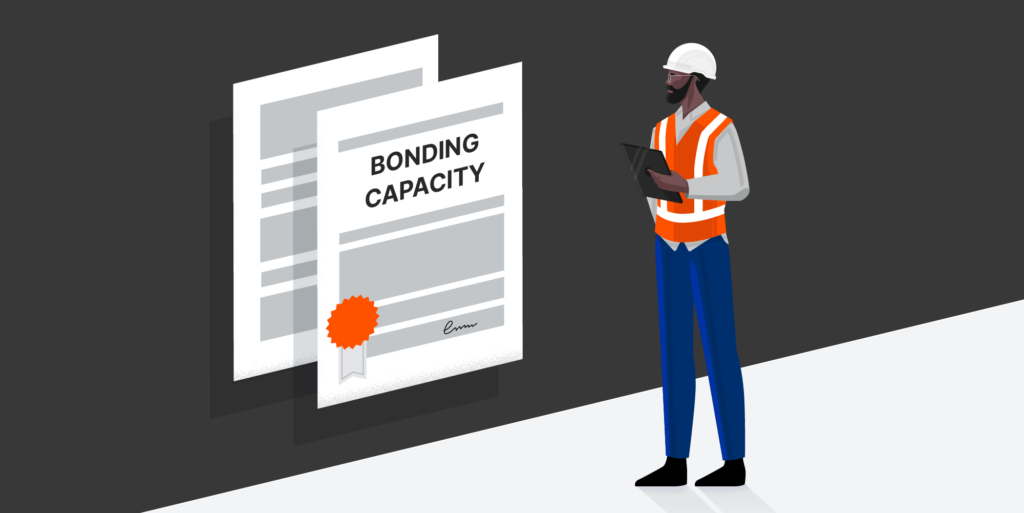— 11 min read
How the Balance Sheet Affects Surety Bond Underwriting

Last Updated Aug 12, 2024

Mike Grillo
Head of Surety Advisory
Mike Grillo, a founding partner of Procore Risk Advisors, brings over a decade of experience in construction surety credit underwriting and brokerage. Mike previously served as a Senior Surety Broker at Aon PLC and Assistant Vice President at Zurich North America, aiding middle market and national contractors. Mike resides in Chicagoland with his family.
Last Updated Aug 12, 2024

In construction finance, a balance sheet is a financial document that a business creates. It lists all of the business's assets, liabilities, and owners' equity to give a snapshot of the company's net worth.
Surety bonds in construction act like a promise that a surety company makes to an owner on behalf of a contractor. The general contractor promises to deliver a project on time, on budget and according to contract terms — seeking backing from the surety company on that promise. In this way, it acts like a co-signature: The general contractor is still the first on the hook if they fail to keep their promise, but the surety will be the next in line. This article will discuss the role the balance sheet plays in a surety bond company's decision on whether and how much to bond to a construction company.
Table of contents
What are commercial sureties?
When the construction industry discusses surety bonds, it often revolves around contract sureties — or those who back the work a general contractor does during the building process. Another kind of surety is a commercial surety, which is a catchall term for bonds required for obligations other than the typical “performance & payment” bonds used in construction. About two-thirds of the industry is contract surety.
A commercial surety might cover a waste disposal company that is contracted to pick up household trash. The company works under long-term contracts to pick up garbage in a municipality. The company may partner with commercial surety that guarantees its work. If it stops doing the work, the bond payout covers the cost of its default — for example, paying another company to pick up the trash.
The Relationship Between Contractors and Sureties
Surety companies use the contracting firm's financial performance, as evidenced by its general ledger, for proof of its creditworthiness. Creditworthiness and mutual trust are the foundations for surety, which is based on a credit relationship. Surety bonds are underwritten to a 0% loss ratio, meaning that when a surety provides a bond, they're doing so under the assumption that the bonded company is not going to default and the surety will not have losses.
It is very common for surety brokers and the surety companies themselves to have extremely strong relationships with the C-suite at construction firms because surety bonds are so critical to the success of many contractors, especially those that do a lot of public work. Projects through state, federal, and municipal governments require bonds, so those contractors could only grow their businesses and get regular work if they could access bonds regularly and expediently.
The close relationship between contractors and surety companies is also necessary to establish trust when so much of the business's financial records and sensitive information are opened up to an outside party.
In some cases, the owners of the construction firm might even personally guarantee the surety program by providing a personal co-signature to the surety. If that contractor's business declares bankruptcy, the surety gains access to all the assets, accounts receivables, cash, equipment and real estate that belong to the business — but also the owner's assets, like a vacation home, cars, jewelry and art.
Part of the broker's job is to advise contractors on their relationships with sureties, including which information the contractor must share to secure a bond and to what extent the surety company may be overreaching in the data it asks for.
How do surety companies decide which contractors are a safe bet?
Bond brokers and surety companies get financial statements, balance sheets, income statements, and cash flow statements from the construction firm, along with all its banking and loan documents.
Through the documentation, sureties get a picture of the contractor's stability and resiliency. For instance, if the contractor gets into a negative cash flow situation, the financial documents start to indicate their ability to carry on with their work. Could they tap the bank-issued line of credit?
Preparing to Apply for a Bond
Establish a surety relationship before it's needed.
Not all contractors need to have an established relationship with a bond company. Contractors doing less than five million in revenue may only need internal statements, which are financial statements automatically produced by the internal CFO or controller using the accounting system. That's generally sufficient to secure bonding for many smaller projects or programs.
As the projects get bigger, owners may increasingly ask for surety backing. The bond company may even accept internal statements for smaller bonds, but larger bonds that stretch the surety's comfort threshold may require financial statements that are verified by an independent third party, like a CPA.
These processes take time — to get certified financial statements in order to get approved by a bond requires some legwork — so it makes sense to have some of this legwork done before the bid comes up that requires it.
Start small.
It's easier to start a relationship with a surety company by starting with small bonds and building up to larger amounts gradually. Applying for small bonds to prove competency before asking for the world allows the contractor to have a very different sort of conversation with the surety company.
Some contractors even choose to bond a job that doesn't require one, eating the cost of the bond to build goodwill by showing the surety they could pull off a successful project. Asking for a bigger bond six months or a year into a surety relationship ensures the surety has an understanding of the business.
Align with experts, not generalists.
Construction has unique aspects that some people don't understand. Contractors' interests are better served by financial pros who work with others in the construction industry and get the rhythm and concerns of typical project work. There are three main financial experts who will serve the growing contractor well.
Surety Advisor
First, surety advisor experts can help contractors navigate the world of surety bonds and get the backing they need on projects.
Banks and Lenders
Next, contractors who don't have much of a relationship with banks or lenders should seek to establish that connection sooner rather than later. Stay away from generalists where possible — some banks may lend to construction companies only to pull a line of credit at the first signal of changing times or at the first sniff of a problem because they don't understand how the industry works.
CPA
Finally, contractors should find a strong CPA who will conduct financial reviews. Partnerships with CPAs may cause some growing pains for some contractors as they seek to align their practices with the generally accepted accounting practices (GAAP) accountants use. Still, those partnerships help build trust and accountability for their businesses.
These three expert teams can help guide the contractor to the next step of growth, and the relationships with them should build as the business' reach does.
Positioning the Balance Sheet for Bonding Success
The surety relationship is built on experience and trust . Contractors can improve their chances of getting approval by reaching out to build those relationships as early as possible because they never know when that bond need will hit.
For contractors that need a bond for a big bid and haven't yet established ties with surety companies, there are things to improve the story that their balance sheet tells.
Use the balance sheet to an advantage.
Surety underwriters generally review three years of information, including the balance sheet, the income statement and the cash flow statement.
There are two common balance sheet metrics on which underwriters focus. First, the underwriter will assess the liquidity of the business, which is how much cash and cash resources are available to pay any short-term obligations and keep the company afloat. The other metric is equity, which is the net worth of the business. Both metrics are important, however some sureties have a preference between these two metrics.
Additionally, the surety will weigh many other factors when asked to provide a bond — such as the type of contractor (GC, specialty), the type of construction (commercial, public, residential), the contractor’s geography, typical contract type (lump sum, cost plus with GMP, etc.), continuity plan and short term forecasts.
For instance, over the course of a project, the GC gets paid first over each pay cycle and may not need as much liquidity or cash in the bank. A GC who doesn't self-perform also won't have crews to pay every two weeks. Subcontractors, on the other hand, still have to pay their crews regardless of the incoming cash. Subs are also farther removed from the cash source, having to wait until the GC gets paid and then pays the sub in turn. For these reasons liquidity is more important for them.
Improve metrics.
There are ways to strengthen your balance sheet to make your business more appealing to a surety. For example, underwriters look at accounts receivable, which is the money owed to a business for completed work.
Sureties will ask for an aging of receivables, which is a document that outlines all receivables and how many days old they are. Based on the aging of receivables, a surety may decide that those over 90 or 120 days old should be considered long-term assets rather than current assets, which will diminish a contractor's liquidity. Aggressively collecting on receivables, particularly those dates 90 days or older, will help improve liquidity.
Liquidity numbers can improve when a contracting firm limits its prepaid bills. On some accounts, businesses can choose to pay a single annual payment or opt for monthly payments. Holding significant balances of prepaid assets on your balance sheet generally negatively impacts the underwriter’s calculation of liquidity. If there ever was a sudden demand for cash, the contractor couldn't draw cash from the prepaid bill. Contractors can improve liquidity by conserving cash by limiting the amount of prepaid assets they hold on the balance sheet
Focus on overall financial health.
There are all sorts of considerations to take into account. A contractor should try and get inside the underwriter's head and understand how they'll view the balance sheet when steering capital to certain sources or making purchasing decisions. All of it can impact a surety program.
Any one or a few of these things may not make or break a bond application, but they contribute to the overall view of a contracting business and its performance. The financial statements can be thought of like the legs of a stool — each one contributes to the integrity of the whole, and if one is broken, the stool no longer looks very effective.
For example, the balance sheet is viewed in light of a company's backlog. A balance sheet might be sufficient when the company has $50 million worth of uncompleted projects. However, that same balance sheet might not be sufficient if that company scores a $30 million job and the backlog jumps to $80 million.
Manage cash availability.
Ownership’s distributions or dividends from the company factor into the financial health of a contractor, particularly when it comes to risk management. A contractor who makes a million dollars but distributes all of it out to ownership may, in fact, be left with an insufficient balance sheet to support the levels of backlog they want to. Generally speaking, the surety wants the contractor to leave money in the business to accommodate the contractor’s growth plans.
Contractors improve their liquidity profile if they have ready access to cash through lender lines of credit. It may be okay for some contractors to have a very small bank line while backing the company with personal funds, but having the bank as an independent third party showing trust in the contractor's abilities often increases the level of comfort a surety has.
Perform consistently.
Sureties want to partner with a contractor who excels in construction. A contractor who delivers on promises, has a track record of running projects profitably, covers overhead, delivers net profit on most projects and maintains a healthy bottom line will be the most attractive, even if they're new to a surety relationship.
Sureties perform trend analysis to get an idea of those metrics. A contracting firm that bids jobs at a 10% margin but routinely closes them at 2% or 3% doesn't look like it can deliver on promises. Meanwhile, a contractor who bids jobs at 5% and closes them at 7–8% looks generally conservative and more likely to over-deliver than under-deliver. That trend analysis tells sureties a lot because while a handful of jobs might go poorly, an overall history of profitability is positive.
Stay updated on what’s happening in construction.
Subscribe to Blueprint, Procore’s free construction newsletter, to get content from industry experts delivered straight to your inbox.

What Contractors Who Appear Risky Can Do
Contractors who struggle to get approved for a bond aren't necessarily stuck. They can work with their surety advisor & surety company to use specific tools to get approved. One of those tools is to use collateral by depositing money to the surety company directly to offset the significant risk they present.
More commonly, contractors can use funds control, during which an independent third party oversees the payment chain process on a particular project.
Contractors can also inject personal funds into the company to increase company equity.
It's important to recognize that part of the value in bonds is that not everyone can get one. The surety prequalification and underwriting process results in bonds being limited to contractors who have the financial & operational strength to successfully deliver on the bonded project at-hand.
Was this article helpful?
Thank you for your submission.
67%
33%
You voted that this article was . Was this a mistake? If so, change your vote
Scroll less, learn more about construction.
Subscribe to The Blueprint, Procore’s construction newsletter, to get content from industry experts delivered straight to your inbox.
By clicking this button, you agree to our Privacy Notice and Terms of Service.
Thank you!
You’re signed up to receive The Blueprint newsletter from Procore. You can unsubscribe at any time.
Categories:
Written by

Mike Grillo
Head of Surety Advisory
Mike Grillo, a founding partner of Procore Risk Advisors, brings over a decade of experience in construction surety credit underwriting and brokerage. Mike previously served as a Senior Surety Broker at Aon PLC and Assistant Vice President at Zurich North America, aiding middle market and national contractors. Mike resides in Chicagoland with his family.
View profileExplore more helpful resources

The Contractor’s Guide to Increasing Bonding Capacity
Contractors who want to work on bonded construction projects will need bonding capacity — the ability to secure a bond to help protect the owner against performance, default, financial or...

How Construction Payment Bonds Work — and Why They Matter
From the smallest home renovation to the largest public works project, the world of construction is backstopped by one fundamental principle: Trust. Owners and public agencies must be able to...

Performance Bonds for Construction Explained
Performance bonds provide a guarantee that a contractor will fulfill all of their obligations under a construction agreement. Performance bonds are a subset of contract bonds and guarantee that a...

Contractor License Bonds: Everything You Need to Know
In order to perform construction work, many states require contractors to be “licensed and bonded.” What does that mean? Well, every state sets its own rules for contractor licensing, and...
Free Tools
Calculators
Use our calculators to estimate the cost of construction materials for your next project.
Templates
Find a template to help you with your construction project tasks.
Material Price Tracker
Get the latest U.S. retail prices and view historical trends for common building materials.
Glossary
Explore key terms and phrases used in the industry.
